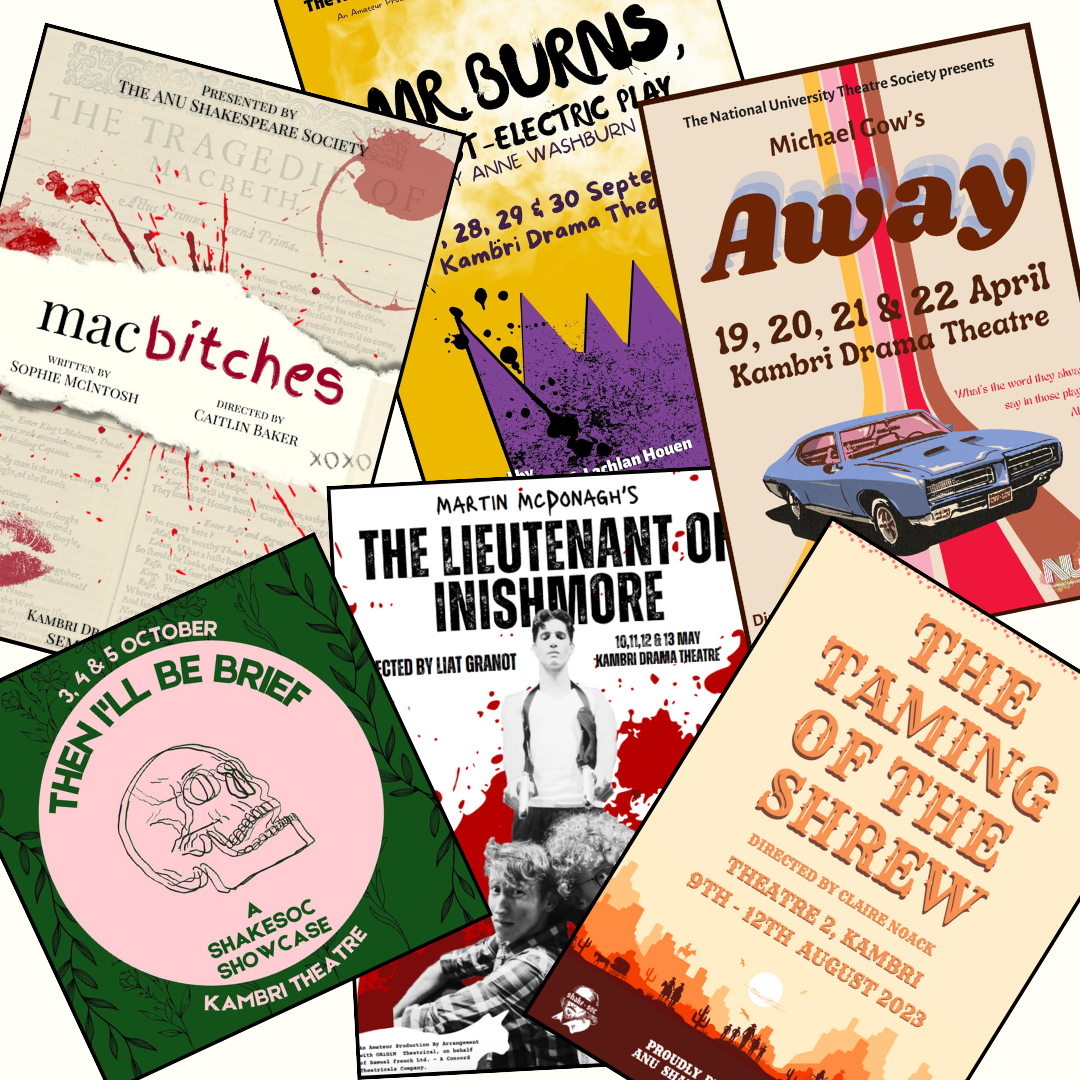Before I start this ranking-slash-review, I want to establish two things. A list before the list.
First of all, I’m not a theatre critic. I don’t have any professional qualifications. I’m just a guy who’s been to a lot of ANU theatre productions, so if you don’t like my ranking you can tell yourself I’m wrong and dumb and just don’t get the sacred art of the stage. Or send Woroni some anthrax in the mail, whatever makes you feel better.
Second of all, every one of these theatre productions were worth seeing. While I enjoyed some more than others, I have an incredible amount of respect for everyone involved. As somebody who got a solid 60 in high school drama, I can’t imagine all the work that goes into making these performances actually good, and definitely couldn’t do it better.
But not all art is created equal, and it is with a sort-of-heavy heart that I must rank (most of) this year’s ANU theatre productions. (Apologies to the Musical Theatre Company, I’m sure Grease was great.)
- Away
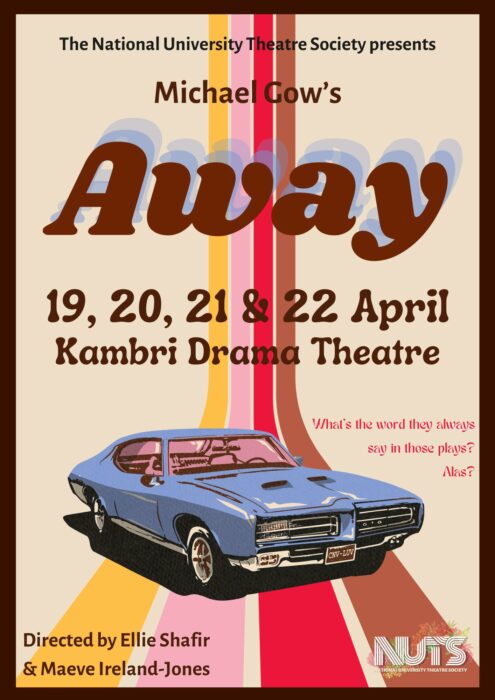 Michael Gow’s Away follows three sets of parents and their high-school-aged children (or lack thereof, in the case of grieving Coral and Ray) as they embark on their summer holidays. It’s mercifully set in Australia, and therefore none of the actors speak with American accents. As you’re about to learn, bad American accents are an inexplicably common pitfall for ANU student theatre.
Michael Gow’s Away follows three sets of parents and their high-school-aged children (or lack thereof, in the case of grieving Coral and Ray) as they embark on their summer holidays. It’s mercifully set in Australia, and therefore none of the actors speak with American accents. As you’re about to learn, bad American accents are an inexplicably common pitfall for ANU student theatre.
Mothers Vic (India Kazakoff), Gwen (Genevieve Cox) and Coral (Grace Fletcher) are standouts, especially Gwen and husband Jim (Eli Narev). Cox and Narev work so well together you’d believe they really have been unhappily married for decades. Their troubled connection with daughter Meg (Chloe Tyrell) made for some of the play’s most dramatic and moving moments. The play deals with some heavy themes – classism, terminal illness, grief – and the actors are talented enough to handle these themes with care, even bringing humour and light to the darkness.
The costuming (Tess McClintock) and hair and makeup (Zara Faroque) were show-stealing: Coral’s blue dress and Leonie’s (Lily Wilmott) green look deserve their own special mention.
However, despite a strong cast and excellent costuming, the play was a little slow. While some scenes would have you laughing or on the edge of your seat, others dragged. No disrespect to Michael Gow, but directors Maeve Ireland-Jones and Ellie Shafir could have been more ruthless in cutting down the script.
Accent ranking: No complaints.
- Then I’ll Be Brief
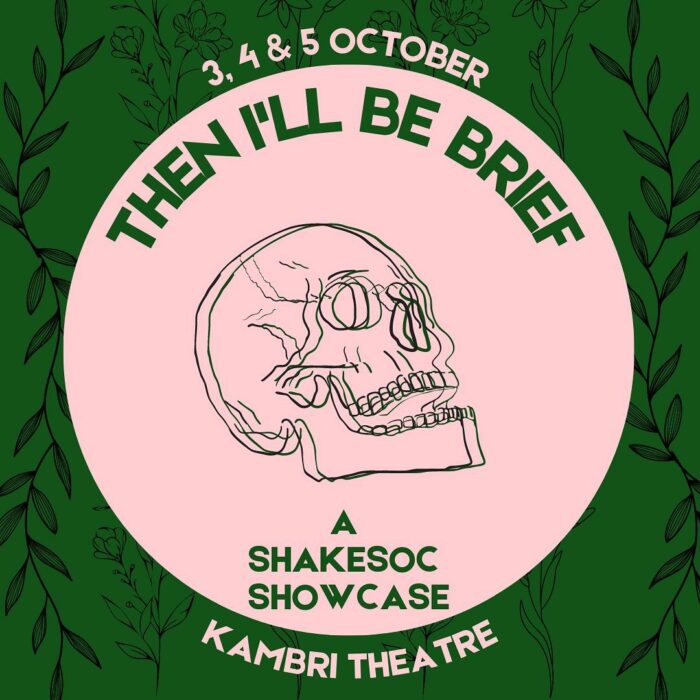 For those who aren’t as dedicated to ANU theatre as I am, Then I’ll Be Brief (TIBB) is an annual show made up of scenes from various Shakespeare plays adapted, reimagined and reprised in whichever way their director chooses. For example, this year I was treated to a bogan version of King Lear (how dare Cordelia go off to ANU), A Midsummer Night’s Bush Doof, and a skit delivered alongside a video of Subway Surfers gameplay, for the iPad babies in the audience.
For those who aren’t as dedicated to ANU theatre as I am, Then I’ll Be Brief (TIBB) is an annual show made up of scenes from various Shakespeare plays adapted, reimagined and reprised in whichever way their director chooses. For example, this year I was treated to a bogan version of King Lear (how dare Cordelia go off to ANU), A Midsummer Night’s Bush Doof, and a skit delivered alongside a video of Subway Surfers gameplay, for the iPad babies in the audience.
It’s hard for a show of snippets and skits to stand on its own against the full-length plays on this list, but TIBB is quick and funny. It feels like a bunch of theatre kids (complementary) having fun, and the audience is drawn into that fun too. The atmosphere is mostly light and silly, with songs like Something Rotten’s ‘God I Hate Shakespeare’ breaking up scenes of fratboy Sir John Falstaff and modern-day Merry Wives.
I say mostly, because there were one or two surprises. Macbeth’s final speech was performed Shakespeare-accurate and serious, except for the fact that Luke Lourey’s Macbeth was dressed like a character from the Matrix and the scene was lit like Upstairs Moose, for reasons unknown. I spent half the scene waiting for a punchline, but that’s the fun of TIBB: you never know what you’re going to get.
Accent: Good and normal.
- The Taming of the Shrew
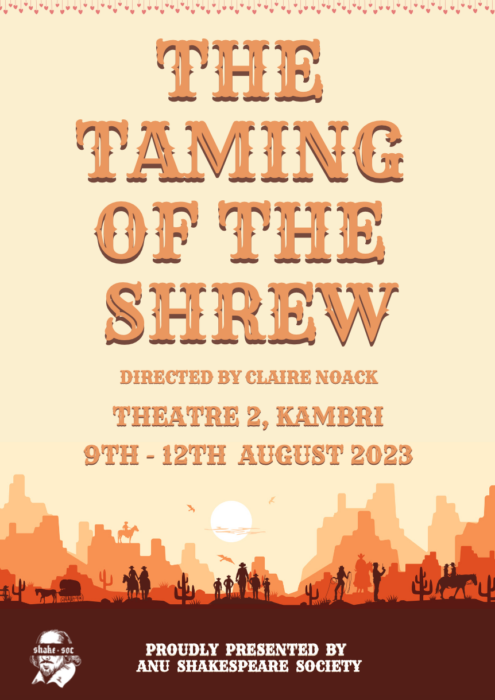 The fact that this is fourth is a testimony to the quality of the shows above it, because ShakeSoc’s The Taming of the Shrew was probably the funniest play I saw this year. It’s inexplicably set in the Wild West, which just means that the actors wear cowboy hats, say they’re from Reno, Nevada, instead of Pisa, Italy, and speak with a Southern drawl (more on the accents later).
The fact that this is fourth is a testimony to the quality of the shows above it, because ShakeSoc’s The Taming of the Shrew was probably the funniest play I saw this year. It’s inexplicably set in the Wild West, which just means that the actors wear cowboy hats, say they’re from Reno, Nevada, instead of Pisa, Italy, and speak with a Southern drawl (more on the accents later).
The thing that really brings the humour of this centuries-old comedy to 21st-century ANU is the performance of the actors. Adam Gottschalk’s Tranio is fine-tuned right down to the facial expressions, and Annabelle Howard’s Baptista incorporates some impressive cane choreography. My personal favourite, however, was Jarrah Palethorpe’s brief but inspired performance as the random merchant pretending to be concerned-father Vincentio. There’s no way I can really describe this, except for saying it was like watching an alien in a human suit. I mean that as positively as possible: it was hilarious.
Now, onto the accents. They have their moments – there is something inherently comedic about country-and-western soliloquies – but the play is long and sparsely edited. The accents hamper the already-unwieldy Shakespearian, and at some points it’s difficult to understand what a character is even talking about.
This is most apparent in the ending. I’ll admit, before this my exposure to The Taming of the Shrew had begun and ended with 10 Things I Hate About You (1999). But I’m pretty sure in the original Shakespeare, the shrew, doesn’t walk her new husband offstage with a gun.
Maybe it was meant to be a feminist twist, but somewhere between the accent and her assumedly ironic speech about why women suck, the ending gets lost, and you’re left with a confused ‘good for her?’
Accent ranking: High highs and low lows.
- Mr Burns
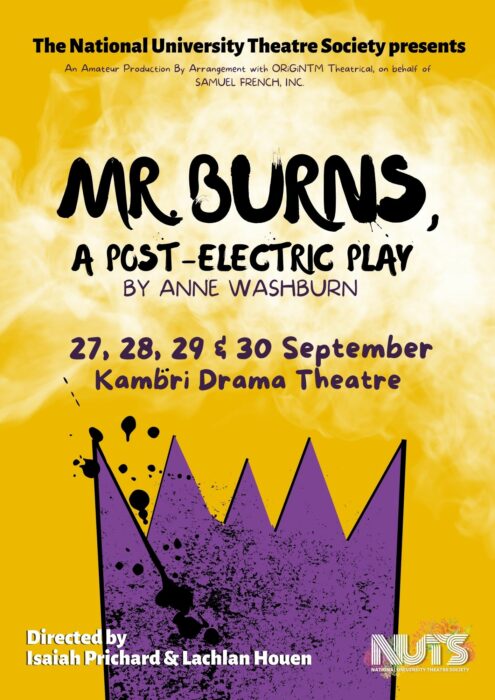 Anne Washburn’s Mr Burns, directed by Lachlan Houen and Isiah Prichard, is split into three sections, and there was no point at which I knew what was coming next.
Anne Washburn’s Mr Burns, directed by Lachlan Houen and Isiah Prichard, is split into three sections, and there was no point at which I knew what was coming next.
It opens on a world without electricity a year after some vague apocalypse, where strangers bond over their attempts to recall a particular Simpsons episode. The tragedy of this situation was accompanied by the tragedy of my realisation that, once again, they were all going to be speaking with American accents.
The first section was a little slow, as you’d expect from a scene that is just people talking around a campfire, but there were genuinely poignant, painful moments. You watch each character’s hopes rise as they encounter a newcomer, and fall as they are told no, they haven’t seen their loved ones. Seven years go by, and these same characters are struggling together as a troupe of actors. Colleen (Natasha Lyall) and Quincy (Tess McClintock) are excellent additions, and Gibson’s (India Kazakoff) breakdown as the pressure of their dog-eat-dog world gets to him is a heartbreaking watch. It’s almost immediately followed by a post-apocalyptic Pitch Perfect-esque mashup, thanks to musical directors Lachlan Moulds and Paris Scharkie. You really never know what’s coming next.
The third section goes completely off the rails. The original cast is abandoned. Now the actual Simpsons – credit to costume designers Malachi Bayley and Natasha Ludlow for an excellent Marge hairpiece – are escaping on a riverboat in the middle of a storm. They’re escaping the titular Mr Burns (Thomas Neil), only this time he’s been combined with Heath Ledger’s Joker to create a villain whose monologues are sometimes ironically overwrought and evil, sometimes just a bit too long. At one point he starts rapping. He and Bart (Annabelle Hansen), who has the pluck and earnestness of a Victorian orphan, duel on the deck of the riverboat as the storm rages around them.
While all the actors were excellent, a special commendation has to go to Eli Powles and Liah Naidoo as Itchy and Scratchy, Mr Burns’ violent animal henchmen. It’s very easy to sit in the audience and write a snarky review where you whinge about accents. It’s undoubtedly much harder to screech and leap and scrabble across the stage dressed as animals. Lesser actors (or cowards like me) wouldn’t have committed as hard as they did, and their resulting performance was both hilarious and more than a little terrifying.
Accent ranking: Eh.
- macbitches
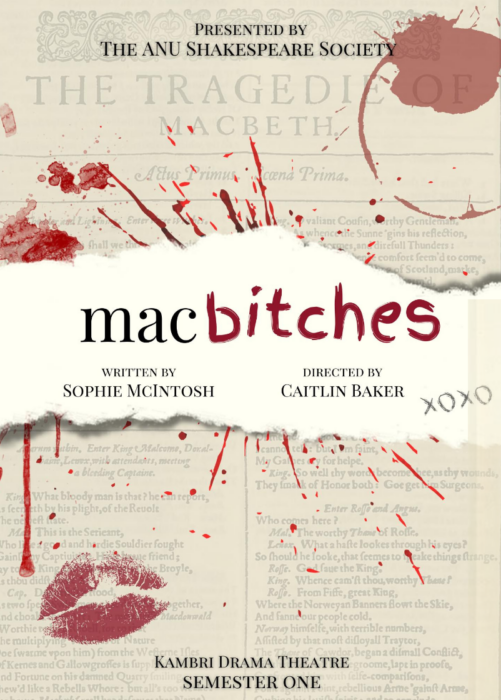 macbitches takes place almost entirely inside a dorm room, where five female theatre students celebrate and commiserate after the casting of Macbeth. It explores the complicated, love-hate-respect-devotion-envy ambition dynamics between theatre kids. Watching it, you can’t help but wonder if ShakeSoc is self-reporting.
macbitches takes place almost entirely inside a dorm room, where five female theatre students celebrate and commiserate after the casting of Macbeth. It explores the complicated, love-hate-respect-devotion-envy ambition dynamics between theatre kids. Watching it, you can’t help but wonder if ShakeSoc is self-reporting.
Trapped in just the one set, the tension builds throughout the play until it’s almost unbearable. You want to look away, but you can’t. Anisha Mujib and Hana Sawal carry this tension with good performances – one feels especially bad for Mujib’s Cam, pathetically in love with a girl who doesn’t seem to care about her – but the eyes-wide, car-crash feel of the play reaches its fever pitch thanks to Natasha Lyall, Winsome Oglivie and Lillia Bank.
Playing new freshman Hailey, who’s snatched the role from the more senior Rachel (Natasha Lyall), Bank nails the grating combination of wide-eyed naivete and constant humble-bragging, but it’s Lyall who steals the show. She is terrifying, stalking the stage, closing in on oblivious Hailey until one can’t help but think of a panther closing in on its prey. I don’t think I breathed during her fight with partner-in-crime Alexis (Winsome Oglivie), who has a sickening scream fit for a slasher movie – sort of what the play devolves into by the end.
But despite its gory twist, this play works so well because it’s grounded in reality. The set design creates a realistic, lived-in college dorm, with dialogue and references that refreshingly reflect how young people actually talk – with the exception of the accents.
macbitches is set in the US, and rather than trust us to suspend our disbelief and accept that these students at a vaguely-American college say words like ‘sophomore’ with an Australian accent, the cast all adopt American accents. It hampers what are otherwise excellent performances – some are strongest when they slip out of the accent altogether.
I saw macbitches with a group, and after we left one of the guys asked us whether this was actually what female friendships were like. The answer was a resounding yes. It’s a warped but strikingly accurate depiction of female group dynamics, as powerful love wars with powerful resentment.
But macbitches goes further than that. Though it’s an all-female cast, it points to the man behind the curtain. Would these women have been pushed to this depravity at all if there were more roles for them, if the roles were better, if they weren’t beaten down by constant dismissal and mistreatment? As director Caitlin Baker puts it, macbitches asks ‘whether the violence lies in the hands of the women we see onstage – or the men off it.’
Accent ranking: Wish they hadn’t.
- The Lieutenant of Inishmore
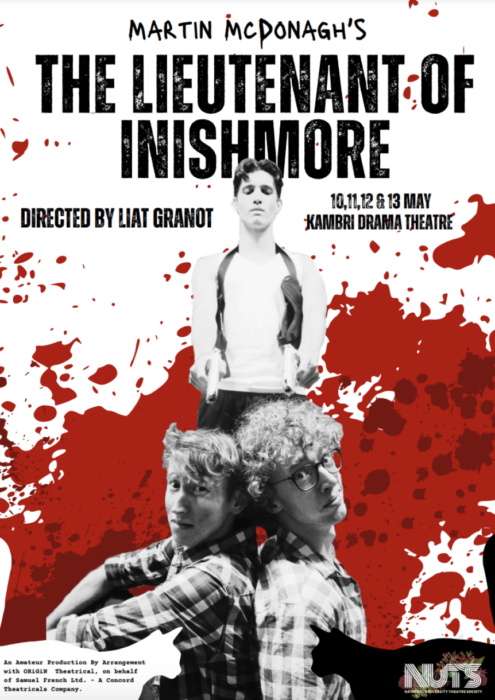 This delightfully gory dark comedy has everything you could want from a play: disembodied torsos covered in blood, Toby Griffiths covered in blood, a stage covered in blood, and Irish accents that are actually good.
This delightfully gory dark comedy has everything you could want from a play: disembodied torsos covered in blood, Toby Griffiths covered in blood, a stage covered in blood, and Irish accents that are actually good.
Martin McDonagh’s The Lieutenant of Inishmore (not to be confused with The Banshees of Inisherin or The Cripple of Inishmaan), brings levity to The Troubles, and in her director’s note, Liat Granot writes that cast and crew wanted to ‘[toe] the delicate line between humour and trauma’. While this production falls far more on the former than the latter, it was still an exceptional performance.
If you’ve reached the end of this review you might think I harp on about the accents, but I think here they’re emblematic of why The Lieutenant of Inishmore was so good: its attention to detail. Set and props designers Marty Kelly, Tali Backmann and Jamie Cardillo decked the Kambri Drama Theatre out with all the trimming of a typical Irish home, complete with the essential photo of Queen Elizabeth II (rip) with her eyes scribbled out and ‘die bitch die’ scrawled across her face. The stagehands crept and rolled commando-style across the set in balaclavas, like they were planting bombs rather than moving chairs. Costume designers Eleanor Cooper and Natasha Ludlow blessed/cursed Davey (Wyatt Raynal) with a painfully 90s mullet-hair piece-thing. This was obviously a performance with a great amount of thought and care put into it, at every level, and it really paid off.
Of course, a script making light of such a dark time in Irish history couldn’t have been carried through without an incredible cast. Adam Gottschalk is, again, excellent and hilarious with his equally funny IRA (or ILA?) lackeys (Paris Scharkie and Anna Kelly). Jamie Gray’s Donny and Raynal’s Davey play off each other like a standup duo who have toured together for several years – which they should consider if theatre doesn’t work out.
If you didn’t see this, you missed out. Raise a glass to the cast, crew, and an Ireland free.
Accent ranking: Derry Girls!
An earlier version of this article did not credit Marty Kelly as set and props designer for The Lieutenant of Inishmore.
We acknowledge the Ngunnawal and Ngambri people, who are the Traditional Custodians of the land on which Woroni, Woroni Radio and Woroni TV are created, edited, published, printed and distributed. We pay our respects to Elders past and present. We acknowledge that the name Woroni was taken from the Wadi Wadi Nation without permission, and we are striving to do better for future reconciliation.
